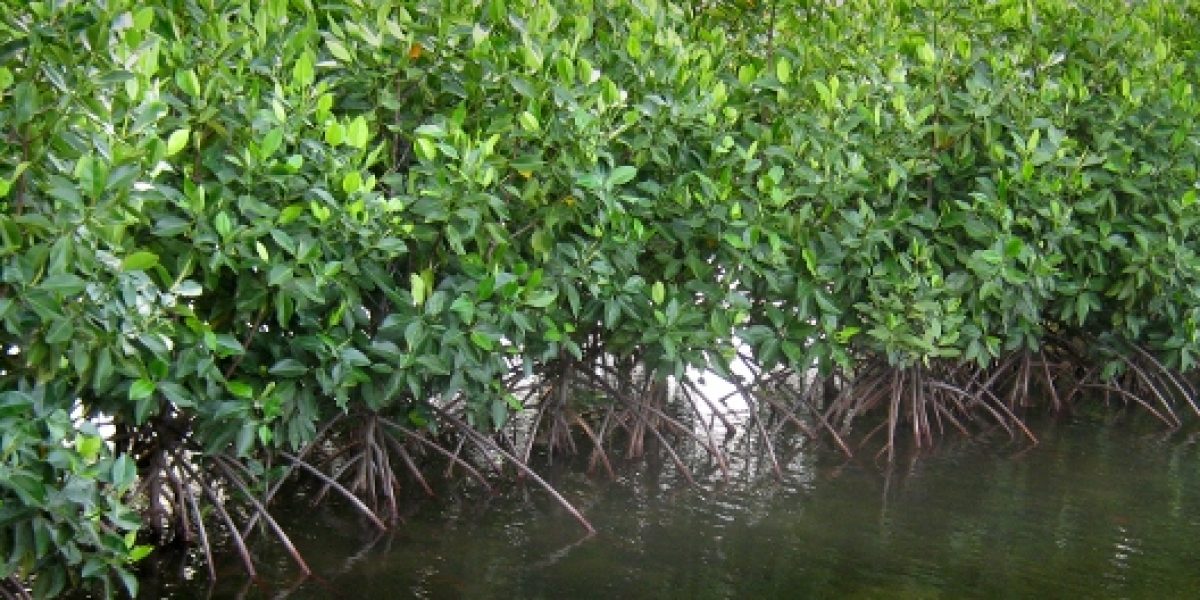As resource-rich African countries are poised to receive an influx of new wealth from oil, coal and gas deposits, the need to motivate for coastal ecosystems to be prioritised, managed more effectively, protected and restored is becoming more urgent. In countries like Nigeria, Guinea Bissau and Mozambique, mangrove and coastal forests coincide with the physical location of fossil fuel discoveries and proposed port and infrastructure developments.
The overlap of these human activities with fragile coastal ecosystems will have devastating consequences on the natural environment, as well as for the communities who depend on them. In the wake of Africa’s extractive industries boom, it is imperative to pursue transformative policy approaches in the management of the continent’s natural capital to ensure that economic growth prospects are more compatible with sustaining vulnerable ecosystems.
Research shows that rich biodiversity and healthy ecological infrastructure underpin and support a country’s social and economic development in many direct and indirect ways. Healthy ecosystems deliver multiple benefits or ‘natural services’ that can help to achieve vital environmental, economic and social objectives. These include, among others, regulating and supporting services such as the protection of shorelines from storms, erosion or rising sea-levels; the provision of habitats and food for fisheries; the sequestration of carbon dioxide; the maintenance of water quality and landscapes for ecotourism; and the provisioning of services that include wood, timber, rattan and charcoal. They also provide communities with irreplaceable goods of an aesthetic, spiritual and cultural nature that cannot be adequately assessed in monetary terms.
To date, many of these natural benefits are not taken into account when assessing the holistic value of coastal ecosystems. Traditional macroeconomic performance indicators – determined by the market – do not effectively capture the dynamic nature and value of life-supporting ecosystem services and therefore do not provide adequate information about a country’s natural wealth and the health of its environment. Ecosystems and their services are an integral component of national wealth and impact significantly on the quality of livelihoods in Africa.
Macroeconomic indicators should therefore better incorporate and reflect these values to incentivise the application of additional and more effective management tools and interventions, and to entice investment back into conservation as opposed to alternative economic activities which carry the opportunity cost of environmental degradation.
Robust economic evaluations could provide evidence to illustrate that total economic (and non-economic) value associated with managing ecosystems more sustainably is often higher than the value associated with the conversion of the ecosystem through farming, mining, logging or other intensive, unsustainable practices. This quantification is important so that the ‘true’ value of ecosystems can be used to inform decision making around development choices, to avoid unwise trade-offs. Where resource exploitation is unavoidable, decisions can be made to minimise the impacts on fragile ecosystems.
Policymakers must become more aware of the combined and cumulative impacts of their decisions on all sectors, so that their choices to pursue mega-projects are well-informed and include effective measures to mitigate environmental destruction. Mangroves and seagrasses, for example, are some of the globe’s most threatened ecosystems, yet they provide multiple benefits to coastal communities and species, including a home and breeding habitat to a wide variety of fish and crustaceans.
Regulatory authorities and other stakeholders in Africa can draw important lessons from recent experiences of countries around the world that have taken bold steps towards protecting their marine and coastal environments.
Saint Maarten, a small island in the Caribbean, has established the country’s first marine national park after a local organisation found that the area’s coastal ecosystems contribute $58 million per year to the economy through tourism and fisheries.
Belize, located close by, also enacted a host of new fishing regulations based on economic valuations conducted by the World Resources Institute, which found that coral reef and mangrove-associated tourism contributes between $150 – $196 million per year to the country’s economy. In 2008, Ecuador was the first country to grant legal rights to nature in its constitution.
Strengthening governance tools and management plans can help to achieve these sustainable development goals. This could be done for example through the use of spatial development plans to assess where there is demographic, economic, social and environmental overlap, with the aim of minimising conflicts in key sectors. Other possible measures include stricter Environmental Impact Assessments, the expansion of Marine Protected Areas, rehabilitation projects and the adoption of an integrated, ecosystem based approach to coastal planning.
At a national level, ecosystem service schemes can be incorporated into existing regulatory and legislative tools to protect vulnerable species and limit their degradation, while coastal ecosystem conservation strategies and actions can be mainstreamed into broader economic planning and development policy at all levels.
There have been some attempts by certain governments to re-align market signals so that they promote environmentally responsible behaviour. These include the use of pollution taxes, subsidies, marketable permits, and performance bonds. These instruments often operate in tandem with mandated regulations and can greatly improve sustainable development outcomes.
Whichever tool is used, it is imperative to better equip decision makers with the information that links the health of coastal ecosystems with the attainment of economic and social goals. While improving management and sustainability, it is vital to ensure that the processes for doing so are inclusive, adaptive and integrative.
Minimising and/or reversing the trend of ecosystem loss and degradation will require a real commitment to developing and implementing robust policies based on the pursuit of sustainable development goals. Incentive structures ought to be used to emphasise the value of natural capital.
In this regard, there is an urgent need for better ecosystem accounting, as well as for new opportunities for payment for environmental schemes, such as Blue Carbon financing through climate change mitigation frameworks.








